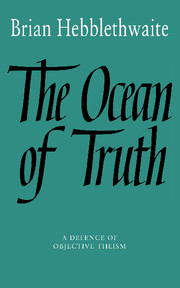Book contents
- Frontmatter
- Contents
- Preface
- 1 Christian belief in God
- 2 The ebbing of theistic faith
- 3 The interiorisation of faith
- 4 Theism in the modern world
- 5 The significance of Kant
- 6 The grounds of theistic belief
- 7 The question of truth
- 8 Religions – theistic and non-theistic
- 9 Life after death
- 10 The Christian Church and objective theism
- Appendix: The Church's ministry
- Notes
- Select bibliography
- Index
2 - The ebbing of theistic faith
Published online by Cambridge University Press: 06 July 2010
- Frontmatter
- Contents
- Preface
- 1 Christian belief in God
- 2 The ebbing of theistic faith
- 3 The interiorisation of faith
- 4 Theism in the modern world
- 5 The significance of Kant
- 6 The grounds of theistic belief
- 7 The question of truth
- 8 Religions – theistic and non-theistic
- 9 Life after death
- 10 The Christian Church and objective theism
- Appendix: The Church's ministry
- Notes
- Select bibliography
- Index
Summary
The nature of objective theism and its centrality for historical Christianity have been set out briefly in chapter one. But even when sketched sympathetically in not obviously outmoded terms, such theism, it must be acknowledged, has come under increasing strain since the Enlightenment and the rise of modern science. In the context of modern western civilisation and in areas increasingly permeated by western culture, it is not easy to retain and live within the theistic framework presupposed and taught by all the Christian churches. The decreasing hold of such belief in God on popular consciousness as well as on the intelligentsia has been documented and studied by many cultural historians and sociologists. Admittedly, this process of secularisation is by no means universal nor uniform. There is still a great deal of religion, including belief in God, to be found in today's world. There is also a great deal of interest in mysticism and the occult. Popular superstititions thrive. Nor are the reasons or causes for the widespread phenomenon of secularisation by any means all rational. We shall consider in this chapter both reasons and causes for the ebbing of theistic faith. I say nothing of the deliberate attempt in communist countries to suppress belief. A case can be made for thinking that policy to be less successful in eradicating belief in an objective God than are the non-coercive factors operative in western liberal societies.
- Type
- Chapter
- Information
- The Ocean of TruthA Defence of Objective Theism, pp. 17 - 34Publisher: Cambridge University PressPrint publication year: 1988



